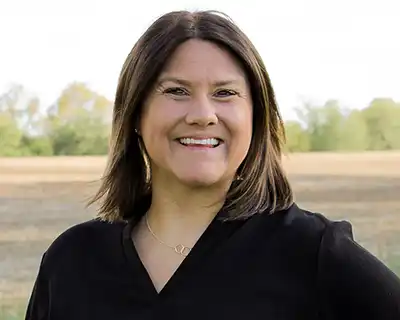
Stewardship is something the Kruegers have passed down through the generations.
“I’ve always felt there was a need for conservationist practices,” Walter Krueger said when he was honored as the 1994 Indiana Master Farm Conservationist of the Year. “God has made a good Earth, and it’s my responsibility to help protect what God has given us.”
Three generations later, Walter’s great-grandson Aaron continues the Krueger legacy. Aaron joined the family farming operation a few years ago after graduating from Purdue University, and almost immediately started to implement cover crops and no-till practices, which he believed could lead to better soil health and profitability.
Grandfather Ronald Krueger was skeptical, doubting that anything his grandson planted into a green cover crop would ever reach stand.
Just a few years later, Aaron has seen such success with his new regenerative practices, he’s leading outreach in his community to bring conservation education and technical assistance to others. Serving as a Conservation Steward for America’s Conservation Ag Movement has allowed Krueger to serve as a liaison between producers and organizations offering technical and financial assistance for conservation agriculture.

During one recent event on his farm in Indiana, the theme that surfaced was how mindset changes are integral to the success of regenerative farming. Just as Ronald’s skepticism slowly faded as yields rose and input costs fell on the Krueger farm, similar stories started to surface as generational producers started to see the results of new practices on their acres.
Indiana grower John Bittner even joked that when his son, Pat, started planting cash crops into green cover crops, his concern was for the neighbors, who he was sure would think they’d gone crazy. But John admitted the mindset change was paying off in their operation, too.
Almost 80 people came to see the Kruger Farm Aug. 17 during the 2023 America’s Conservation Ag Movement Farmer-Led Field Day, where Aaron was joined by other speakers including fellow Indiana grower Cameron Mills of Mills Family Farms and representatives from USDA-NRCS and Purdue Extension, who shared insights learned from their knowledge and experimentation of how cover crops and soil health practices can help boost weather resiliency and profitability on farms in Indiana.

Some of the key takeaways included:
- Cover Crop Mixture is Key – “Wheat is a good starter program for a cover crop, but it likes to put on roots when it flowers, which is problematic,” Krueger says. “My advice is to look beyond just wheat into rye and a mixture.” Like most growers, Krueger says he experiments with his cover crop mix, but mostly chooses to stay with a grass, legume, and brassica trident. His preferred mix ahead of corn includes four total legumes because they are easy to plant into, making it easy to plant into green, which is important on his farm. Peas as his main legume, Krueger says, works well because peas produce a lot of biomass that is easily digestible. Mills told the group that his cover crop mixture is designed to slow-release nutrients throughout the growing season.
- Keep A Cover On Your Soil – “Soil cover begins at harvest time,” said Travis Gogel, Southwest Indiana Soil Scientist with USDA-NRCS. “One of the things we are looking for as an NRCS planner is that we don’t want to see any bare soil in the fields at any point in the season.” For Krueger, keeping his cover crop going throughout the season provides many benefits, including maintaining soil temperature and reducing inputs. “Since we’ve started using more peas and vetch in our cover crop mix, we’ve been weaning our nitrogen use back,” he says. “And we aren’t using as many herbicides and fungicides because keeping your soil covered helps to suppress disease.”
- Know Your Soil – Gogel brought with him many tools and tricks to help growers stay knowledgeable about their soil health, but he says one tool serves as a baseline measurement. “Carry a shovel into the field with you, at the very least,” Gogel said. “If you can stick your shovel into the ground, that’s a good way to see that you don’t have any compaction issues or infiltration issues.”

America’s Conservation Ag Movement combines the technical and financial assistance of USDA-NRCS with expertise and funding from private partners to empower producers to consider climate-smart practices, products and technologies. Learn more about the Krueger farm and how other producers are using cost-share programs to improve their operations at America’s Conservation Ag Movement.



